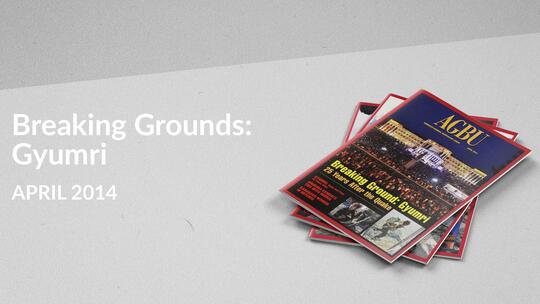All eyes are on the first generation of students that participated in Armenia's compulsory chess program—the first in the world—who will graduate this year from elementary school.
Some 40,000 children will have completed the three-year course this spring. There are high hopes that their targeted education in the game of strategy will yield positive results in their secondary education, and also for their country.
Armen Karagulyan started his school's chess program last fall 2013, but his teacher and parents already believe the second-grader could be a future champion.
Karagulyan's mother recalled how, after only four lessons, the teacher was so impressed in the seven-year-old boy's abilities that he suggested enrolling him in additional lessons through the Armenian Chess Federation.
"The teacher says Armen will become the World Champion," beamed Ruzanna Igityan, who has since enrolled her son in extra classes at the Federation.
Chess is a national pastime in Armenia and its top players are treated as celebrities. The country boasts a three-time champion of the Chess Olympiads and has 30 grandmasters. Levon Aronian is currently ranked the second- best player internationally, according to the World Chess Federation.
During the Soviet years, the game captured the attention of the nation and the Eastern Bloc. In 1963, Tigran Petrosian became world champion by beating one of the greatest players in history, Mikhail Botvinnik.
Today, Armenia is seeking to take that enthusiasm and aptitude to the next level by nurturing the still-experimental elementary school chess program.
Education Minister Armen Ashotyan notes that Armenia has long looked to the West in developing its academic programs. But today, he says, Armenia has something to teach with its unique initiative.
Teachers to Coaches
Since the program's initiation, students in grades two through four set aside their books twice per week to take up bishops and queens. President Serzh Sargsyan, who nominally presides over the Armenian Chess Federation, approved the program, which was put in place by the Federation, the Chess Academy and the Ministry of Education in Armenia's 1,400 elementary schools.
Preparation for the ambitious program began one year before it was integrated in the traditional curricula, with school teachers being trained by professional coaches from the Chess Academy. More than $1.5 million was spent on creating the courses, producing the textbooks, equipping classrooms and other aspects of the program.
According to Varsine Manandyan, who organizes programs for the Chess Academy, half of the 1,300 chess instructors are professionals, while others are teachers of math, informatics, or other related subjects.
"The main challenge of the chess program is that professional chess coaches don't have all the teaching skills, while school teachers who were retrained as chess coaches are not very versed in chess," said Manandyan.
Samvel Misakyan of the Chess Academy says that the main challenge in developing chess courses is the preparation of elementary school teachers.
Two years ago, chess was added to the curriculum of the Faculty of Elementary School Education at Armenia's Pedagogical University.
"In three years, we will have the first class of graduates with a certificate for teaching chess," said Misakyan, a chess lecturer at the university.
There are plans in the works to implement the same program in Nagorno Karabakh Republic, where a pilot program is currently being run. Karabakh already participated in the Republican Interschool Chess Olympiad, organized by the Chess Federation and sponsored by the AGBU.
The annual event brings together students from Armenia, Karabakh and Javakhk (Georgia's majority-Armenian region) to compete. AGBU has donated more than 6,300 chessboards and 180 chess clocks, as well as over 100 netbooks and computers, projectors and other gifts for the winners. "Until recently, only high school students participated, but now most of the participants are elementary school students," said Misakyan, who notes that the Olympiad also serves as a venue to scout out future talent.
Many parents and teachers back the program, but not for the competitive factor. Most are eager to encourage a new way to learn.
"Chess is a unique tool for children, because it is a game and science at the same time," said Mikael Khachatryan, a chess teacher at No. 130 School, where Armen Karagulyan studies.
"It develops a child's logic, the ability to deliberate steps and to work out strategies," he said.
Iren Mirzoyan, another student in Khachatryan's class, says chess is one of her favorite subjects.
"I like our lessons," she said. "We start by going over the rules, and then the teacher shows on the big chess board how the pieces move. It's kind of hard, but interesting."
Iren's mother, Anna Babayan, encourages her daughter, even though she does not expect Iren to become a professional: "This three-year course is enough to develop qualities in children that are indispensable in life: attention span, patience and the ability to concentrate and think logically."






